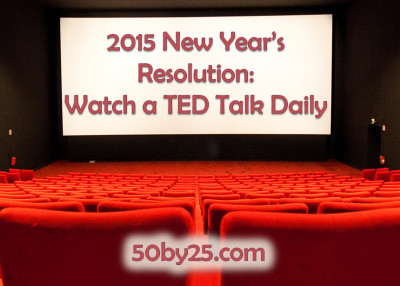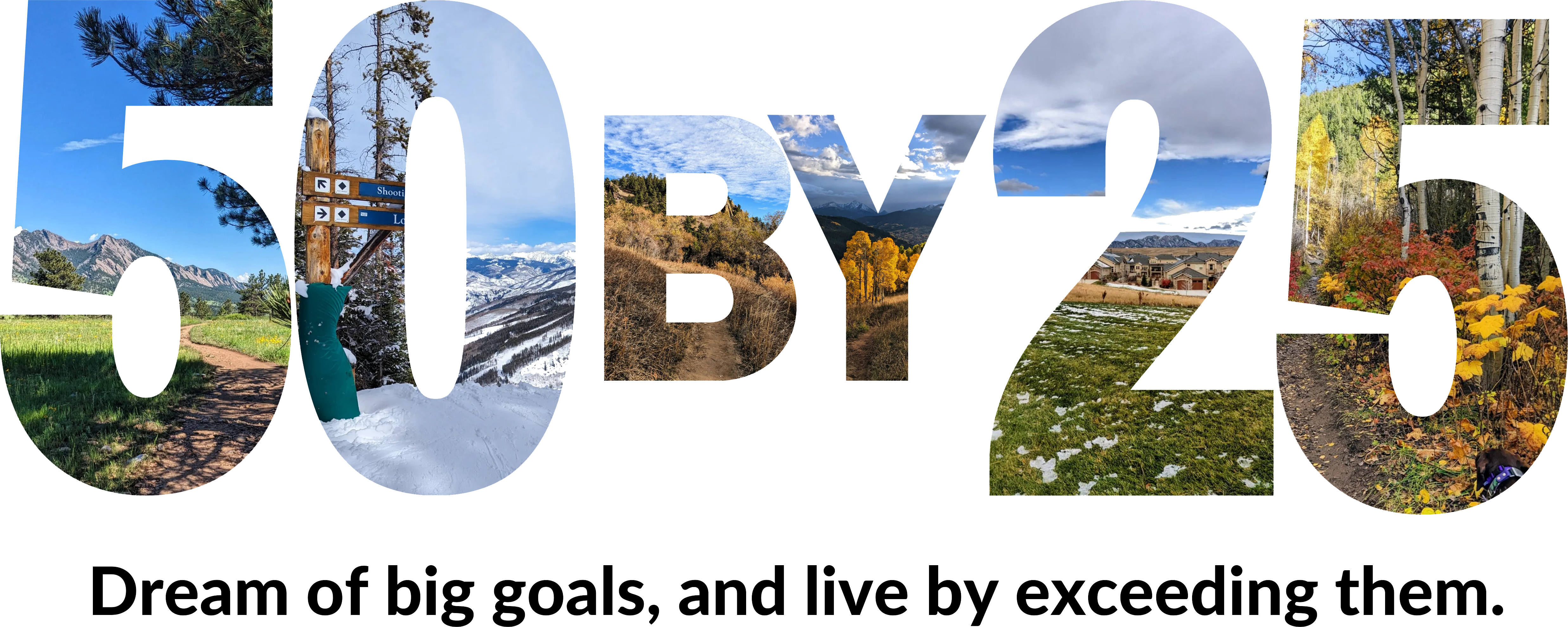I know it took me a while to post my New Year’s resolutions this year! However, my resolution to watch a TED Talk every day is one that I didn’t write about immediately but have been doing pretty solidly since the end of December. It’s been so interesting to start my day learning something new! You can view all of the TED talks I’ve watched on this Google spreadsheet (along with some notes about what I learned or my favorite quotes); however, I wanted to take a minute to call out my favorite ones this month.

The very first TED talk I watched to kick off this whole thing was How to Buy Happiness. In it, speaker Michael Norton discusses how if you use money for yourself, you usually don’t end up any happier (the hedonic treadmill eventually resets you back to zero); however, if you spend money on other people, you can actually affect your own happiness. He references a few people who have made it a project to give money away daily, and I thought that sounded like an awesome idea… but I haven’t actually done it. So maybe not as inspiring as I first thought, but I rated it 4.5 (out of 5) stars at the time.
If you’re looking for something quick but inspiring, check out The Psychology of Time, by Philip Zimbardo. It’s only 6.5 minutes long, but has some really cool insights on how changing your “time perspective” can help you change the choices you make.
“The paradox of time perspective, is something that influences every decision you make, you’re totally unaware of. Namely, the extent to which you have one of these biased time perspectives. Well there is actually six of them. There are two ways to be present-oriented. There is two ways to be past-oriented, two ways to be future. You can focus on past-positive, or past-negative. You can be present-hedonistic, namely you focus on the joys of life, or present-fatalist — it doesn’t matter, your life is controlled. You can be future-oriented, setting goals. Or you can be transcendental future: namely, life begins after death.”
I think it’s really interesting that simply by recognizing what time perspective is your default, you can then begin to shift your time perspective in response to certain situations – and then impact the decision that you make.
Another TED talk that for me changed my outlook was Kelly McGonigal’s How to Make Stress Your Friend. We all think of stress as a bad thing, but Kelly points out that we can instead think of our body’s natural stress response as a positive thing, since the adrenaline prepares your body to take on a challenge. This is particularly relevant to athletes, who need to operate at peak performance! But also, if you can view your stress response as helpful instead of problematic, it actually causes physiological changes so that your blood vessels relax in response – essentially, preventing a stress-induced heart attack. Who knew?!
Finally, the TED talk I rated highest this month was actually a TEDx talk (which surprised me because those are typically lower-quality than the mainstage TED talks, since they usually have fewer applicants for each speaker slot). I heard about Why Most Entrepreneurs Are Slowly Killing Themselves for an article on the Top 10 Most Viewed TEDxMile High Talks, and I could definitely see why it was one of the most viewed – I loved it! Speaker Phil Drolet talks about the lives of top entrepreneurs, and how they’re not always as rosy as we might think.
A lot of entrepreneurs are workaholics, prone to poor health and poor relationships. No pain, no gain, right? But Drolet promotes a philosophy of working smarter, not harder. (Easier said than done, of course, but definitely great to keep in mind.) For me, the most notable part of this talk was the point that before you emulate someone because you assume that they’re a success, you should look at the big picture of their life – and remember that there’s a lot you aren’t seeing. So many of us look at Facebook, Instagram, or other sites that seem to give you a view into someone else’s world – but you have to remember that that’s the “highlight reel” of their life and you might not see the areas where they’re failing as a result of how hard they work in those areas. Life involves tradeoffs, and it’s important to be aware of those tradeoffs before you make them.
Honorable mention TED Talks of the month:
Learning to be awesome at anything you do, including leadership. Key takeaway: Know yourself to identify flaws, pick one thing to focus on, and practice daily.
The happy secret to better work. Key takeaway: Writing down things you are happy about trains your brain to look for the positive in life.
Our unhealthy obsession with choice. Key takeaway: A lot of choice is not rational, and it”s freeing to remember that and not take choices too personally.
How to make hard choices. Key quote: “When alternatives are on a par, it may matter very much which you choose, but one alternative isn’t better than the other.” … “So when we face hard choices, we shouldn’t beat our head against a wall trying to figure out which alternative is better. There is no best alternative. Instead of looking for reasons out there, we should be looking for reasons in here: Who am I to be?”.
The art of choosing. Key takeaway: Whether choice is good or bad, and who or how a choice should be chosen, is heavily affected by culture.
(Note: I watched a lot of TED talks on “choice” this month because I ended up searching the app for that keyword, hoping that it would help with my house hunting and ensure that I make a good decision.)
In Praise Of Slowness. Key quotes: “‘Slow’ is a dirty word in our culture. It’s a byword for ‘lazy,’ ‘slacker,’ for being somebody who gives up. You know, ‘he’s a bit slow.’ It’s actually synonymous with being stupid.” … “By slowing down at the right moments, people find that they do everything better.”
The key to success is grit. Key takeaway: Frequently grit occurs in the absence of talent – the growth mindset is actually a better predictor of success.
How to make work-life balance work. Key quote: “Being a fit 10-hour-a-day office rat isn’t more balanced; it’s just more fit.”
What’s the “coolest” way to lose weight?. Key takeaway: Running a marathon only burns 1/2 pound, and then you eat it all back. Weight loss needs to be gradual – like with cold thermogenesis. (I wrote about this in my blog post on turning down the temps in my apartment.)
The puzzle of motivation. Key quotes: “If-then rewards work really well for tasks where there is a simple set of rules and a clear destination to go to. Rewards, by their very nature, narrow our focus, concentrate the mind; that’s why they work in so many cases. … ut for the real candle problem, that reward actually narrows our focus and restricts our possibility.” … “Those 20th century rewards, those motivators we think are a natural part of business, do work, but only in a surprisingly narrow band of circumstances. Those if-then rewards often destroy creativity. The secret to high performance isn’t rewards and punishments, but that unseen intrinsic drive — the drive to do things for their own sake. The drive to do things cause they matter.”
How to save the world (or at least yourself) from bad meetings. Key takeaway: Don’t go to a meeting without asking the goal of the meeting and your role in achieving it.
Weird or Just Different?. Key quote: “Whatever brilliant ideas you have or hear, the opposite may also be true.”
The power of believing you can improve. Key takeaway: Students did better when instead of a failing grade they were given a grade of “not yet”. Now that is positive thinking!
Any TED talks you want to recommend that I can watch over the next month?

I’ve started listening to Podcasts on my walks into work and on my runs instead of just music. I feel like I’m learning and I’m much more productive as a result. I may also have to see if I can work in some TED talks.
I love listening to podcasts while I run! However, one thing to note is that I don’t find I do as hard of an effort when I’m listening to them, so now I use them mostly for training runs but still listen to music when I am racing.
Yay! Thanks for these! I’ve started listening to TED talks or podcasts while I clean and do food prep on Sundays, so I’m stoked to have some more to add to my list!
I LOVE listening to TED Talks while cooking – for me that’s the perfect balance of being able to focus on what they’re saying while also do something else at the same time.
My response to the Puzzle of Motivation, also relevant to some of the other TED talks, and also relevant to at least one of the current Links I Love.
Obviously something really struck a chord with me.!
Love that you wrote such a long response to it – I just left a comment for you on your own blog 🙂